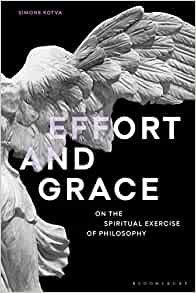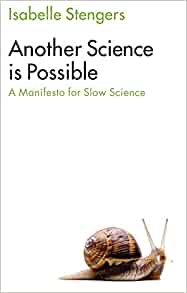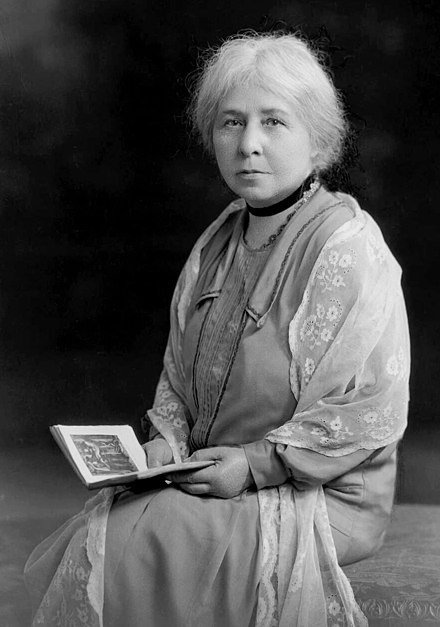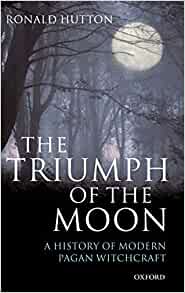Kotva Replies: Thinking through the Middle Voice
Simone KotvaMarie Cabaud Meaney’s recent review essay of my book, Effort and Grace: On the Spiritual Exercise of Philosophy, raises several interesting points that invite further discussion, and I thank the editors for allowing me the opportunity to address two of them briefly here.
The reviewer asks about the outsider status of Weil, suggesting that Weil’s autobiography is more minoritarian than her thinking. The two – life and writing – are of course inseparable, as Meaney also notes, but it is perhaps worth reflecting further on Weil’s subalternity also from the point of view of intellectual history, and the significance of intellectual (as well as biographical) subalternity when thinking together with Weil.
A model of agency based around the middle voice

Weil behaved in odd ways but her thinking also flowed along unconventional currents. There is no modern philosophy of passive being comparable to the long tradition, culminating in Kant and Hegel, of philosophers analyzing the resilience and indomitable heroism of spirit. Throughout modernity, whenever we encounter passivity it is as a pejorative quality that signals inferiority. The idea of agency, according to the Oxford English Dictionary, is an idea of someone or something acting upon their environment and exerting their power over it, usually in opposition to the recipient or patient of the action.
The understanding one is then dangerously close to asserting that only those who exert power over their environments are agents. In order to avoid falling into that understanding, however, it is not necessary to go the opposite extreme of valorizing passivity for its own sake. What I argue is that Weil proposes instead a model of agency based around the middle voice, in which the doer is neither active nor passive but operates in a third space, the space of receptivity, alert awareness, and attentiveness.

As Jonardon Ganeri writes in his recent and brilliant study of attention: “our relationship to our environment is . . . less like a spotlight shone on a screen, [but] more like an aperture whose shape, size, and tilt can be adjusted from either side” (Attention, Not Self p. 12). The idea that agency is not reducible to autonomy, or rather, that autonomy is inseparable from dependency, has always been a minor position in philosophy — something that is reflected, I think, in the fact that those currents, today, in which the critique of the self-possessed Enlightenment subject is most developed, are also those representing marginalized communities.
One will not find the alternative account of agency articulated by Weil in mainstream philosophy (which tends rather to reinforce ideals of the “self-made man” responsible for their own success). One will find it, however, figuring prominently in feminist criticism, queer, post-colonial and decolonial theory, eco-criticism and of course in the theologies conversant with these movements.
Weil and the occult

Then there is the question of Weil and the occult. In the epilogue of Effort and Grace I refer, in passing, to a comparison which the Belgian philosopher Isabelle Stengers makes between attention (l’attention, the same concept used by Weil) in Christian mysticism and attention in modern witchcraft (cf. Isabelle Stengers, Another Science is Possible: Manifesto for a Slow Science, where Stengers is writing about Starhawk and the reclaiming tradition of modern witchcraft). I reflect on what Stengers calls the witches’ “art of attention” as a way of tracing the present and the possible futures of a middle-voiced attention into the political spirituality of the current Anthropocene epoch (a theme that now occupies my current work).
Although my reference to Stengers does not make any claims regarding Weil, and refers to middle-voiced attention as a spiritual practice rather than as a specifically Weilian idea, the reviewer, understandably, wonders whether witchcraft is a religion and whether Weil would have considered it “inauthentic.” I encourage readers interested in Weil’s opinion on what constitutes authentic religion to peruse the exhaustive references supplied by the reviewer. I have also written at greater length on Weil and the occult in a recent article: “The Occult Mind of Simone Weil,” Philosophical Investigations 43 (2020): 122-141.
Briefly, Weil defined religious authenticity as true contact with the divine. This is a very broad definition and one that deliberately seeks to distinguish truth from dogma. For this reason, Weil took a keen interest in spiritual currents with outsider status with regard to orthodox texts and institutions, including mysticism, various heresies (especially Gnosticism), paganism, and of course, non-Christian traditions. She read widely in comparative religion and speculated on the deeper meaning of occult symbolism, including astrology and the Tarot.
Granted, Weil was intensely suspicious of the theatricality and exaggerated claims of public occultists and had little positive to say of Theosophy. However, this suspicion was not directed at the occult as such – to the contrary, Weil was fascinated, not to say obsessed, with the idea at stake in the very notion of occultism (from a word meaning “hidden”): that there exists a secret key to all mythologies conveyed by clandestine societies and mystery traditions predating Christianity. In particular, Weil’s passionate defense of Catharism – which she interpreted, implausibly but ingeniously, as a remnant of an ancient, peace-loving mystery cult oppressed by power-hungry clerics devoted to a God of violence and terror – is remarkable.

Given her enthusiasm for the neo-Catharism of Déodat Roché, there is very good reason to assume that Weil would have read with pleasure Margaret Murray’s The Witch-Cult of Western Europe (1921) and The God of the Witches (1933), the two books that inspired the modern pagan witchcraft movement. A student of early modern heresy and (like Weil) deeply fascinated with the Cathars, Murray attempted to demonstrate how churchmen had misrepresented as devil-worship what was in truth the last remnant and the secret survival of the ancient mystery cults: peace-loving religions that had flourished in pagan Europe before being exterminated brutally by the forces of imperial Christendom.

In the 1950s, Murray’s work helped to inspire modern witchcraft, which is indeed a religion: it is a reinvention of the ancient mystery cults of pre-Christian Europe centering on ecstatic worship and communion with the divine and with specific deities (see Ronald Hutton, The Triumph of the Moon, 1998, for a history of the movement and its sources). It is followers of this witchcraft, in turn, whom Stengers invokes in her interpretation of “attention.”
Would Weil have considered Stengers’ witches authentically religious? Yes and no. Very likely, she would have celebrated their religious experiences and spiritual practices, developed, as they were, out of a desire for the mysteries — for the same reason that Weil considered Cathars, Gnostics and devotees of the Greek mysteries to be authentic “Christians.” This does not mean, of course, that Weil would have refrained from casting aspersions on the politics that now accompany modern witchcraft, in the same way that she did not keep back from attacking Christianity qua public institution.

Authentic religion
In short, Weil’s concept of authentic religion was (rightly or wrongly) an attempt to distinguish experiences of the divine from discourse and theories about the divine – very similar to the way in which Michel de Certeau (who greatly admired Weil) distinguished mysticism from theology. At bottom, then, the radical openness that characterizes Weil’s practice of middle-voiced attention emerges in her work not only in response to other creaturely beings but also to other traditions. Weil thought that every religion conveyed a perspective on truth and that a religion was inauthentic insofar as it presented itself as an exclusive possessor of truth. This, the relative insignificance of any one tradition in relation to the experience of the divine, is an aspect of her work that remains largely unthought.
Dr. Simone Kotva is on the Faculty of Divinity at the University of Cambridge.
1 Recommendation
